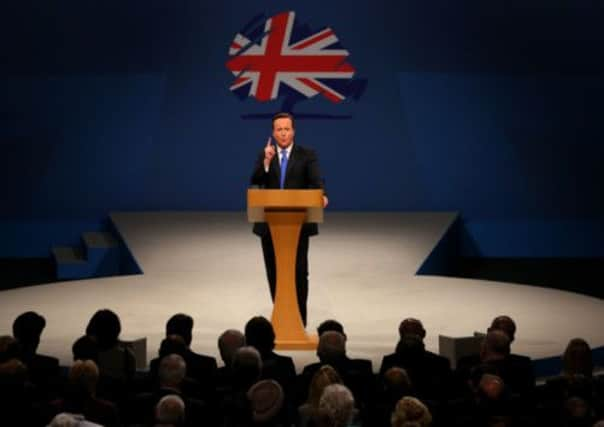Tom Richmond: Cameron’s ‘land of opportunity’ still unlikely to be a land of Tory majority


Yet, after evoking the American dream with a well-delivered “land of opportunity for all” party conference speech that repudiated Ed Miliband’s business-bashing and the wishy-washiness of the Liberal Democrats, the Conservative leader will have to draw inspiration from the “land of the free” if he is to have any chance of winning the 2015 election.
Despite the passing of time, Ronald Reagan’s jibe at the incumbent Jimmy Carter in the 1980 US presidential race – “Are you better off now than you were four years ago?” – remains the defining test for every re-election campaign on both sides of the Atlantic.
Advertisement
Hide AdAdvertisement
Hide AdAs Bill Clinton observed in 1992: “It’s the economy, stupid.” Yes, Ukip and Nigel Farage’s “barmy army” will be factors on polling day in 18 months’ time but there is a danger that the Tories over-estimate Europe’s importance as an electoral issue. If the EU is such an issue, why was William Hague’s “save the pound” campaign crushed by Tony Blair in 2001?
It is this: the electorate still votes with its pockets and Tory ‘big beast’ Ken Clarke, a veteran of those times, hit the nail on the proverbial head this week when he said “everyone is being driven up the wall” by rising prices.
It is why Miliband stole the agenda with his politically game-changing, but totally shameless promise to freeze household energy bills, even though it was the Labour leader – as Energy Secretary in the last government – who presided over the steepest increase in bills.
Even though it could lead to long-term investment in energy projects being marginalised, Miliband made a crude calculation that this policy chimes with public opinion.
Advertisement
Hide AdAdvertisement
Hide AdIn this respect, Cameron was right not to respond with a rival measure of his own – the public are tired of unsustainable promises that are too good to be true. This was a mature and measured speech, confidently delivered, in which the PM demonstrated that he is clearly on the side of those hard-working people who expect their endeavours to be rewarded with the evolution of a low tax society that is pro-investment and less dependent on the public sector.
As Phil Orford, chief executive at the Forum of Private Business, rightly observed: “The Prime Minister was high on ideology and low on new policy but unequivocal in backing business and entrepreneurs. Profit and enterprise are not dirty words. Profit is the driving force for many in setting up a small business and enterprise is the backbone of any innovating nation.”
Unlike the depressing tone to Miliband’s clunkily-delivered “Britain can do better than this” address, Cameron was impressive when he listed the coalition’s achievements – whether it be tackling the deficit, transforming schools or remedying the NHS’s care failures – and how these are the building blocks for Britain’s renewal.
This provided a timely contrast to the unedifying political paralysis in the USA, even though the PM chose not to credit the Lib Dems with helping to form a stable government that has enabled Britain to begin the return to prosperity. He should have done. Without their support, Cameron would already be yesterday’s man.
Advertisement
Hide AdAdvertisement
Hide AdYet here is the key question: will this vision, and the warning that Britain faces seven more years of austerity to finish the repair job to the economy, be sufficient to keep the PM in his job in May 2015?
The Tory leader’s ambition is certainly more dynamic, forward-thinking and credible than the Labour alternative as he sought to reach out to “the millions of hard-working people who renew the great in Great Britain every day”.
He can be fairly certain that the Conservatives will retain its support in its southern heartlands where the economic recovery is at its most advanced. At worst, he will get the benefit of the doubt in these areas.
He can also be confident that Scotland – or Wales – will not return a sizable number of Conservative MPs in 2015. Many in the Celtic nations are still unwilling to give the Tory party the time of day.
Advertisement
Hide AdAdvertisement
Hide AdThat leaves the key marginals along the M62 corridor –and across the North – where the Tories and Labour are beginning a desperate scrap for supremacy.
Bellweather seats that delivered three thumping majorities for Margaret Thatcher, and which enabled John Major to defy the odds in 1992, they denied Cameron an outright majority in May 2010 and are likely to do so again in 2015.
The reason? Irrespective of the extent to which Ukip split the centre-right vote, Cameron’s Tories are still perceived to be out of touch in the North.
Not only do they need to retain the support that they won in 2010, but also reach out to those who were still prepared to entrust Labour at the height of the slump.
Advertisement
Hide AdAdvertisement
Hide AdI just can’t see the recovery coming in time to persuade people to switch allegiance in sufficient numbers, even though Cameron’s rallying cry – “the best way out of poverty is work and the dignity that brings” – chimes with a county that places a premium on endeavour and thrift.
My verdict? A 2015 election that ends in stalemate and another coalition. It could be worse. It could be America. At least David Cameron has begun turning Britain into a land of opportunity for all, even if he’s not rewarded for putting the need to build a long-term and responsible recovery before Labour’s short-term and irresponsible opportunism.